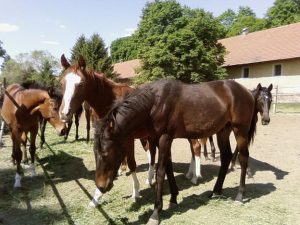By NewsDesk @bactiman63
A 7-year-old Cumberland County mare is the first reported case of Eastern Equine Encephalitis (EEE), a serious mosquito-borne illness in horses, in New Jersey for 2021. The mare had not been vaccinated against EEE and was humanely euthanized on August 19, 2021.

Public domain image/Dusan Bicanski
“We continue to encourage horse owners be vigilant in vaccinating their animals against these diseases spread by mosquitoes,” New Jersey Secretary of Agriculture Douglas H. Fisher said. “Vaccinated animals are much less likely to contract deadly diseases such as EEE and West Nile Virus.”
EEE causes inflammation of the brain tissue and has a significantly higher risk of death in horses than West Nile Virus infection.
West Nile Virus is another serious mosquito-borne viral disease that affects a horse’s neurological system. The diseases are transmitted by a mosquito bite. The virus cycles between birds and mosquitoes with horses and humans being incidental hosts.
EEE infections in horses are not a significant risk factor for human infection because horses (like humans) are “dead-end” hosts for the virus. Reported animal West Nile Virus (WNV) cases in New Jersey this year have been limited to wild avian species, three Cooper’s hawks and one American crow.
Livestock owners are strongly encouraged to vaccinate against WNV, EEE and other mosquito-borne diseases. Effective equine vaccines for EEE and WNV are available commercially. Horse owners should contact their veterinarians if their horses are not up to date on their vaccinations against both EEE and WNV.
- Modernized tetracycline antibiotic, NUZYRA, added as alternate agent to treat plague
- Ebola case in Côte d’Ivoire ‘declared cured’, 82 contact traced in two countries
- Brazil: Great-grandmother, child die from spotted fever in Belo Horizonte, Minas Gerais
- Albuquerque zoo loses second ape to Shigella infection
- Oregon: Gov Kate Brown says public must wear masks outdoors, Regardless of vaccination status
- Pork rinds linked to scores of salmonella cases across the UK
- Plague in Ituri Province, DRC: ‘Grave consequences for children’, says UNICEF
- Two multistate outbreaks of Salmonella infections: Italian-style meats likely source


One thought on “New Jersey reports first Eastern Equine Encephalitis case in Cumberland County horse”